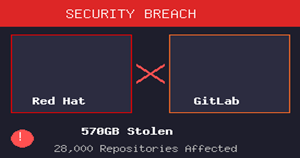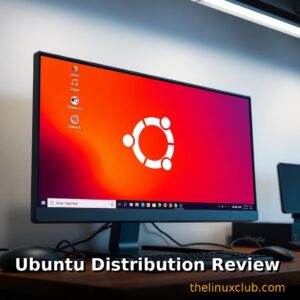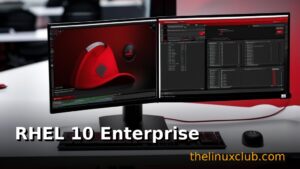AlmaLinux Linux Distribution Review

🎯 Key Takeaways
- Introduction to AlmaLinux
- Key Features and Advantages
- System Requirements
- Installation Guide
- Package Management
📑 Table of Contents
AlmaLinux is a community-owned and governed, forever-free enterprise Linux distribution focused on long-term stability and providing a robust production-grade platform. It is 1:1 binary compatible with Red Hat Enterprise Linux (RHEL) and serves as a direct replacement for CentOS Linux after its discontinuation. Born from the CentOS community in 2021, AlmaLinux has quickly become one of the leading RHEL alternatives, backed by CloudLinux Inc. and governed by a non-profit AlmaLinux OS Foundation.
📑 Table of Contents
- Introduction to AlmaLinux
- Key Features and Advantages
- RHEL 1:1 Binary Compatibility
- Community Governance
- Long-Term Support and Stability
- CloudLinux Backing and Commercial Support
- System Requirements
- Minimum Requirements
- Recommended for Production
- Installation Guide
- Download and Installation
- Migration from CentOS Linux
- Post-Installation Setup
- Package Management
- DNF Package Manager
- Repository Management
- AlmaLinux Editions
- AlmaLinux OS
- AlmaLinux Cloud Images
- AlmaLinux Container Images
- Security and Compliance
- Security Features
- Live Patching with KernelCare
- AlmaLinux vs Alternatives
- AlmaLinux vs Rocky Linux
- AlmaLinux vs CentOS Stream
- AlmaLinux vs RHEL
- Commercial Support Options
- TuxCare Enterprise Support
- Community and Ecosystem
- Resources
- Frequently Asked Questions
- What is the difference between AlmaLinux and Rocky Linux?
- Is AlmaLinux truly free and will it stay free?
- Can I migrate from CentOS 7 or CentOS 8 to AlmaLinux?
- Does AlmaLinux have commercial support available?
- Is software certified for RHEL compatible with AlmaLinux?
- How long is each AlmaLinux version supported?
- Can I use AlmaLinux in production environments?
- What architectures does AlmaLinux support?
- How does AlmaLinux governance work?
- Should I choose AlmaLinux or CentOS Stream?
- Conclusion
Introduction to AlmaLinux
AlmaLinux emerged in response to Red Hat’s December 2020 announcement that CentOS Linux would end support in 2021, shifting focus to CentOS Stream. Within months, CloudLinux Inc. committed $1 million annually and formed the AlmaLinux OS Foundation as a 501(c)(6) non-profit organization. The name “Alma” means “soul” in Spanish and Latin, reflecting the community-driven spirit. Since its first stable release in March 2021, AlmaLinux has gained widespread adoption, powering millions of servers worldwide as organizations migrate from CentOS Linux.
Key Features and Advantages
RHEL 1:1 Binary Compatibility
AlmaLinux maintains bug-for-bug compatibility with RHEL:
- Identical Packages: Same package versions, dependencies, and functionality
- Drop-in Replacement: Seamless migration from CentOS or RHEL
- Application Compatibility: Software certified for RHEL runs on AlmaLinux
- Repository Structure: Mirrors RHEL repository layout
- ABI Compatibility: Application Binary Interface matches RHEL
Community Governance
AlmaLinux is truly community-owned:
- Non-Profit Foundation: AlmaLinux OS Foundation (501c6) governs the project
- No Single Owner: Cannot be controlled by one company
- Community Board: Elected representatives make decisions
- Transparent Operations: Open governance and financial transparency
- Forever Free: Commitment to remaining free and open source
Long-Term Support and Stability
- 10-Year Lifecycle: Each major release supported for full decade
- Security Updates: Regular CVE patches and security fixes
- Bug Fixes: Critical and important bug corrections
- Predictable Releases: Follows RHEL release schedule
- Production-Grade: Enterprise-ready stability
CloudLinux Backing and Commercial Support
- Financial backing from CloudLinux Inc.
- TuxCare provides commercial support options
- Live patching available through KernelCare
- Migration assistance and consulting available
- Infrastructure and development resources committed
System Requirements
Minimum Requirements
- Processor: x86_64 (Intel/AMD 64-bit)
- Memory: 1.5 GB RAM minimum
- Storage: 10 GB disk space
- Architecture: x86_64, aarch64 (ARM64), ppc64le, s390x
Recommended for Production
- Processor: 2+ cores for server workloads
- Memory: 4 GB RAM or more
- Storage: 40 GB+ with appropriate RAID
- Network: Redundant network interfaces
Installation Guide
Download and Installation
# Download AlmaLinux ISO
wget https://repo.almalinux.org/almalinux/9/isos/x86_64/AlmaLinux-9-latest-x86_64-dvd.iso
# Verify checksum
sha256sum AlmaLinux-9-latest-x86_64-dvd.iso
# Create bootable USB
sudo dd if=AlmaLinux-9-latest-x86_64-dvd.iso of=/dev/sdX bs=4M status=progress oflag=direct
syncMigration from CentOS Linux
# Install migration script
curl -O https://raw.githubusercontent.com/AlmaLinux/almalinux-deploy/master/almalinux-deploy.sh
# Run migration (CentOS 8 to AlmaLinux 8)
sudo bash almalinux-deploy.sh
# Reboot after migration
sudo reboot
# Verify conversion
cat /etc/redhat-release
# Should show: AlmaLinux release X.XPost-Installation Setup
# Update system
sudo dnf update -y
# Install EPEL repository
sudo dnf install epel-release -y
# Configure firewall
sudo firewall-cmd --permanent --add-service=ssh
sudo firewall-cmd --reload
# Enable automatic security updates
sudo dnf install dnf-automatic -y
sudo systemctl enable --now dnf-automatic.timerPackage Management
DNF Package Manager
# Update system
sudo dnf update
# Install package
sudo dnf install package-name
# Search packages
dnf search keyword
# List installed packages
dnf list installed
# Clean cache
sudo dnf clean all
# Install package groups
sudo dnf groupinstall "Development Tools"Repository Management
# List repositories
dnf repolist
# Enable PowerTools (CodeReady Builder equivalent)
sudo dnf config-manager --set-enabled powertools
# Add EPEL for additional packages
sudo dnf install epel-releaseAlmaLinux Editions
AlmaLinux OS
Standard server and desktop distribution with full RHEL compatibility. Available for x86_64, aarch64, ppc64le, and s390x architectures.
AlmaLinux Cloud Images
Official images for all major cloud providers:
- Amazon Web Services (AWS)
- Microsoft Azure
- Google Cloud Platform (GCP)
- Oracle Cloud Infrastructure (OCI)
- Generic Cloud/OpenStack images
AlmaLinux Container Images
Official container base images for Docker, Podman, and Kubernetes deployments. Minimal, base, and full image variants available.
Security and Compliance
Security Features
- SELinux: Security-Enhanced Linux enabled by default
- Secure Boot: UEFI Secure Boot support
- FIPS 140-2: Federal compliance ready
- Security Advisories: Timely RHSA (Red Hat Security Advisory) equivalents
- CVE Tracking: Rapid security vulnerability patching
Live Patching with KernelCare
# Install KernelCare for live kernel patching
# Eliminates need for reboots after kernel updates
# Available through TuxCare commercial supportAlmaLinux vs Alternatives
AlmaLinux vs Rocky Linux
Both are 1:1 RHEL clones and CentOS replacements. AlmaLinux has CloudLinux backing and earlier market entry; Rocky Linux is led by CentOS founder Gregory Kurtzer. Both are excellent choices—selection often comes down to community preference or existing relationships.
AlmaLinux vs CentOS Stream
CentOS Stream is upstream development platform for RHEL with rolling updates. AlmaLinux is downstream rebuild with point releases and longer testing. Stream previews future RHEL; AlmaLinux mirrors released RHEL. Choose Stream for development/testing; AlmaLinux for production stability.
AlmaLinux vs RHEL
RHEL offers commercial support, certifications, and 10-year lifecycle with guaranteed SLAs. AlmaLinux provides identical functionality free with community support. RHEL for mission-critical systems requiring vendor support; AlmaLinux for cost-effective enterprise Linux.
Commercial Support Options
TuxCare Enterprise Support
Commercial support available through TuxCare (CloudLinux division):
- 24/7 technical support
- Live patching (KernelCare)
- Extended lifecycle support
- Security hardening assistance
- Migration consulting
Community and Ecosystem
Resources
- AlmaLinux Forums: Community discussion and support
- Mattermost Chat: Real-time community chat
- AlmaLinux Wiki: Documentation and guides
- Reddit: r/AlmaLinux community
- GitHub: Source code and issue tracking
- Mailing Lists: Development and announcement lists
Frequently Asked Questions
What is the difference between AlmaLinux and Rocky Linux?
Both are 1:1 RHEL clones and excellent CentOS replacements. AlmaLinux is backed by CloudLinux Inc. and governed by a non-profit foundation, launched in March 2021. Rocky Linux is led by CentOS co-founder Gregory Kurtzer, launched in June 2021. Both offer identical RHEL compatibility, 10-year support, and community governance. Choice often depends on community preference, existing vendor relationships, or minor implementation differences.
Is AlmaLinux truly free and will it stay free?
Yes, AlmaLinux is completely free and committed to remaining free forever. The AlmaLinux OS Foundation is a 501(c)(6) non-profit organization that legally cannot be owned by a single entity. CloudLinux provides financial backing but doesn’t control the project. The foundation’s bylaws ensure AlmaLinux remains community-governed and free.
Can I migrate from CentOS 7 or CentOS 8 to AlmaLinux?
Yes, AlmaLinux provides migration scripts for converting CentOS 7 to AlmaLinux 7 and CentOS 8 to AlmaLinux 8. The process preserves your data and configurations. Migration from CentOS 7 to AlmaLinux 7 is supported until June 2024. Always backup before migration and test in non-production environments first.
Does AlmaLinux have commercial support available?
Yes, TuxCare (CloudLinux division) offers commercial support including 24/7 technical assistance, live patching with KernelCare, extended lifecycle support, and migration consulting. Other third-party vendors also provide AlmaLinux support. Community support is available free through forums, chat, and documentation.
Is software certified for RHEL compatible with AlmaLinux?
Generally yes, due to 1:1 binary compatibility. However, some vendors explicitly certify only RHEL. Test thoroughly in your environment. Many software vendors now officially support AlmaLinux including cPanel, Plesk, CloudLinux, and others. The ecosystem continues growing as AlmaLinux adoption increases.
How long is each AlmaLinux version supported?
Each AlmaLinux major version receives 10 years of support, matching RHEL. AlmaLinux 8 supported until 2029, AlmaLinux 9 until 2032. This includes security updates and critical bug fixes. Extended lifecycle support may be available through commercial vendors like TuxCare.
Can I use AlmaLinux in production environments?
Absolutely. AlmaLinux is production-ready and designed for enterprise workloads. It powers web servers, databases, cloud infrastructure, and mission-critical applications worldwide. With RHEL compatibility, 10-year support, and strong backing, AlmaLinux is suitable for production use. Many organizations have migrated production systems from CentOS to AlmaLinux successfully.
What architectures does AlmaLinux support?
AlmaLinux supports x86_64 (standard 64-bit Intel/AMD), aarch64 (ARM 64-bit), ppc64le (IBM POWER), and s390x (IBM Z mainframes). This matches RHEL architecture support, making AlmaLinux suitable for diverse infrastructure from cloud instances to mainframes.
How does AlmaLinux governance work?
AlmaLinux is governed by the AlmaLinux OS Foundation, a 501(c)(6) non-profit. The board includes representatives from sponsors, contributors, and community. Major decisions require board approval. CloudLinux provides financial support but has no controlling interest. This structure ensures the project remains community-driven and cannot be unilaterally changed.
Should I choose AlmaLinux or CentOS Stream?
Choose AlmaLinux for production stability—it’s a point-release distribution with thorough testing, 10-year support, and 1:1 RHEL compatibility. Choose CentOS Stream for development, testing, or seeing upcoming RHEL features—it’s a rolling release that tracks slightly ahead of RHEL. Most production environments should use AlmaLinux; development environments can benefit from Stream’s preview of future RHEL changes.
Conclusion
AlmaLinux has successfully filled the void left by CentOS Linux’s discontinuation, providing organizations with a reliable, free, enterprise-grade Linux distribution with true RHEL compatibility. With its strong community governance through a non-profit foundation, financial backing from CloudLinux, 10-year support lifecycle, and commitment to remaining forever free, AlmaLinux offers an excellent platform for production environments requiring enterprise Linux without licensing costs.
Whether you’re migrating from CentOS, seeking RHEL compatibility without subscription fees, or building new infrastructure on a stable enterprise platform, AlmaLinux delivers the reliability, security, and longevity that modern organizations demand. The project’s rapid adoption and growing ecosystem demonstrate that community-driven enterprise Linux is not only viable but thriving.
Official Website: almalinux.org
Download: Get AlmaLinux
Documentation: AlmaLinux Wiki
Forum: Community Forums
Was this article helpful?
About Ramesh Sundararamaiah
Red Hat Certified Architect
Expert in Linux system administration, DevOps automation, and cloud infrastructure. Specializing in Red Hat Enterprise Linux, CentOS, Ubuntu, Docker, Ansible, and enterprise IT solutions.


